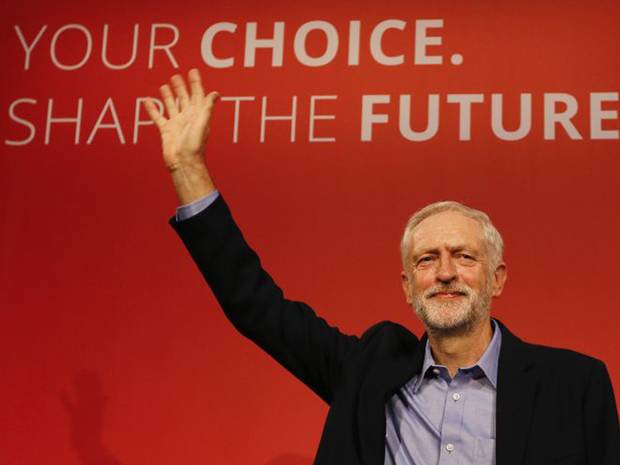In the wake of Jeremy Corbyn’s re-election to the Labour leadership, socalistparty.ie spoke to Sarah Sachs-Eldridge (National Organiser of the Socialist Party in England & Wales) about the lessons of the last year and how the fight for an anti-austerity alternative can be taken forward.
Despite massive attacks, Corbyn has been re-elected leader with an increased majority. Why has this happened?
This victory and the support for Jeremy Corbyn are an expression of the anger against austerity and the rejection of the pro-cuts Blairites and Tories who have dominated Parliament for decades. Corbyn’s anti-austerity message, support for trade union rights, free education, council housing and so on has changed the terms of political debate.
Citing figures does no justice to the devastation that has been wrought on people’s lives but they can give a glimpse of what is making people angry. While average pay in Britain has fallen by 10.4% since 2007, six million live below the poverty line, and almost a million workers struggle on zero-hour contracts, the wealth of the richest 1,000 people in Britain has doubled.
The coup and the challenge from former Big Pharma rep Owen Smith are an attempt by the right to reclaim Labour as a party that stands for the richest 1% – the bosses’ second 11 if you like.
The establishment media is participating in this civil war for Labour’s future, too. No one is surprised that researchers found that 75% of press coverage “misrepresents” Corbyn.
And we have seen the lengths the right-wing in Labour – with their claws deep into the party machinery – will go to undermine the enormous support there is for Jeremy Corbyn and anti-austerity struggle. Almost 330,000 were excluded from voting in an even more extensive purge than took place in 2015. Left-led Constituency Labour Parties have been suspended. Trade union leaders have even been suspended from membership and excluded from voting.
The coup began in the wake of the Brexit vote. What effect has this vote had on British society?
Brexit was a major defeat for British capitalism. All the major capitalist parties, the vast majority of the capitalist press, the Bank of England and most of the big business bosses threatened workers with financial Armageddon if they voted ‘Leave’. But the Brexit vote – fundamentally a working class uprising – rejected all of them and struck a huge blow against the capitalist establishment. Its ramifications are still being felt.
The Tories are split down the middle, Cameron and Osborne were forced to flee and the new appointed PM Theresa May must appear, in words at least, to have made some break with their austerity.
May cannot consolidate power with a snap general election, primarily because the government cannot agree on a strategy for Brexit. They hold a wafer-thin majority in Parliament. In 2015, the Tories were elected by only 24% of voters. They are deeply unpopular and their announcements are viewed with scepticism.
But for the nine months between Corbyn’s election as leader and the vote, the Labour right-wing was always looking for a hook on which they could hang their coup. Post-Brexit, they expected a general election. Far from fearing a Corbyn-led party would lose, as they claimed, they were petrified, that he’d win, that the working class’s hunger would grow with the eating and his government would come under pressure to make more far-reaching reforms.
Jeremy Corbyn has been a lifelong opponent of the EU. But he called for a ‘Remain’ vote under enormous pressure to compromise from the Labour right. This was a mistake – had he maintained his position, he could have led an internationalist, left-wing Leave campaign and cut across the racism that was pumped out by the leaders of both official campaigns, potentially winning voters on both sides to socialism
.But now’s the time to drive home the advantage against the split and weak Tories with an unambiguous, unapologetic anti-Tory, anti-austerity challenge. Clearly, this is impossible with the Blairites undermining him from within.
Corbyn is under a lot of pressure to “unite the party.” Is there room for compromise with the Blairites?
Uniting with the Blairites cannot work. Compromise with the Blairites means compromising with the bosses when they demand lower taxes for them and lower wages and lower living standards for us. We’ve had enough of that.
Labour under Corbyn can make big gains by showing it stands on the side of workers and that it is in government and councils to fight austerity. That will mean Labour councils carrying out no further cuts, no longer passing down the Tory hatchet. Now he has been re-elected, he must organise for Labour councils to defy the Tories, with re-empowered local parties pressing councillors to fight austerity or step aside for those who will.
The Blairites have no intention of compromising – having lost this challenge they are preparing alternative strategies. They have pushed for elections of the Shadow Cabinet to isolate and limit Jeremy Corbyn’s leadership with the hope of removing him at a later date. Annual leadership elections are also sought. But it’s them who should face democratic reselection.
What should Labour members now do to take full control of their party?
Mandatory reselection must be part of re-founding Labour as a party fit for the purpose of fighting the weak and divided Tories. People queue to sign petitions that call for deselection – to get rid of the Blairites.
The more the Labour right and their echoes in the media insist that the demand for deselection must be dropped, the clearer it is that it is they who must be removed. That’s why there must also be moves from above to kick out the Blairites – why should MPs have the right to call themselves Labour if they are voting against a renewed mandate of anti-austerity, anti-war policies, support for fighting workers and anti-cuts campaigns?
To become a democratic socialist party of the working class also means re-democratising Labour. The Blairified structures must be opened up. We call for a democratic and federal structure that would allow political parties like the Socialist Party, others involved in the Trade Unionist and Socialist Coalition (TUSC) and anti-austerity Greens to affiliate to Labour as the Co-Op Party still does.
District Labour Parties must be restored to hold councillors to account, but also to determine election manifestos, etc. Labour’s annual conference has been a toothless affair but should once again become the supreme policy-making body. And, of course, in a workers’ party there must be a central role for the trade unions so they can act collectively in the party.
Corbyn has been a lifelong socialist and his views are clearly popular among young people and workers. What type of programme do we need today to challenge capitalism?
There are 172 MPs who voted ‘no confidence’ in Jeremy Corbyn. It’s clear that a break with them could initially result in a party with fewer MPs. But if such a party has a fighting, socialist programme, it would be much more effective in the struggle against the bosses, Tories and austerity than a party with hundreds of Tory-lite MPs.
All the indicators from the leadership election campaign show that the bolder the programme put forward at the rallies, the greater the support for Jeremy Corbyn.
In Seattle in the US, socialist councilwoman Kshama Sawant was re-elected against a massive challenge from the corporate-backed Democrats because she was identified with the victory for a $15/hour minimum wage in the city, the fight for rent control and measures that take the wealth off the 1%.
A party with socialist policies that refuses to support austerity and backs workers and communities in struggle would take seats off the Blairites and potentially other pro-capitalist parties.
What role can the Socialist Party play in these developments?
We participate in the movement to build support for Jeremy Corbyn and oppose the right, particularly through our significant role in the trade unions. We put forward a programme to consolidate his victory. That means putting forward ideas on how Labour can be transformed into a party for the 99% with clear, anti-austerity policies.
Most importantly, we fight for socialism – for taking the major corporations and banks that dominate the economy into democratic public ownership, in order to begin to build a society that meets the needs of all instead of providing profits for a few












